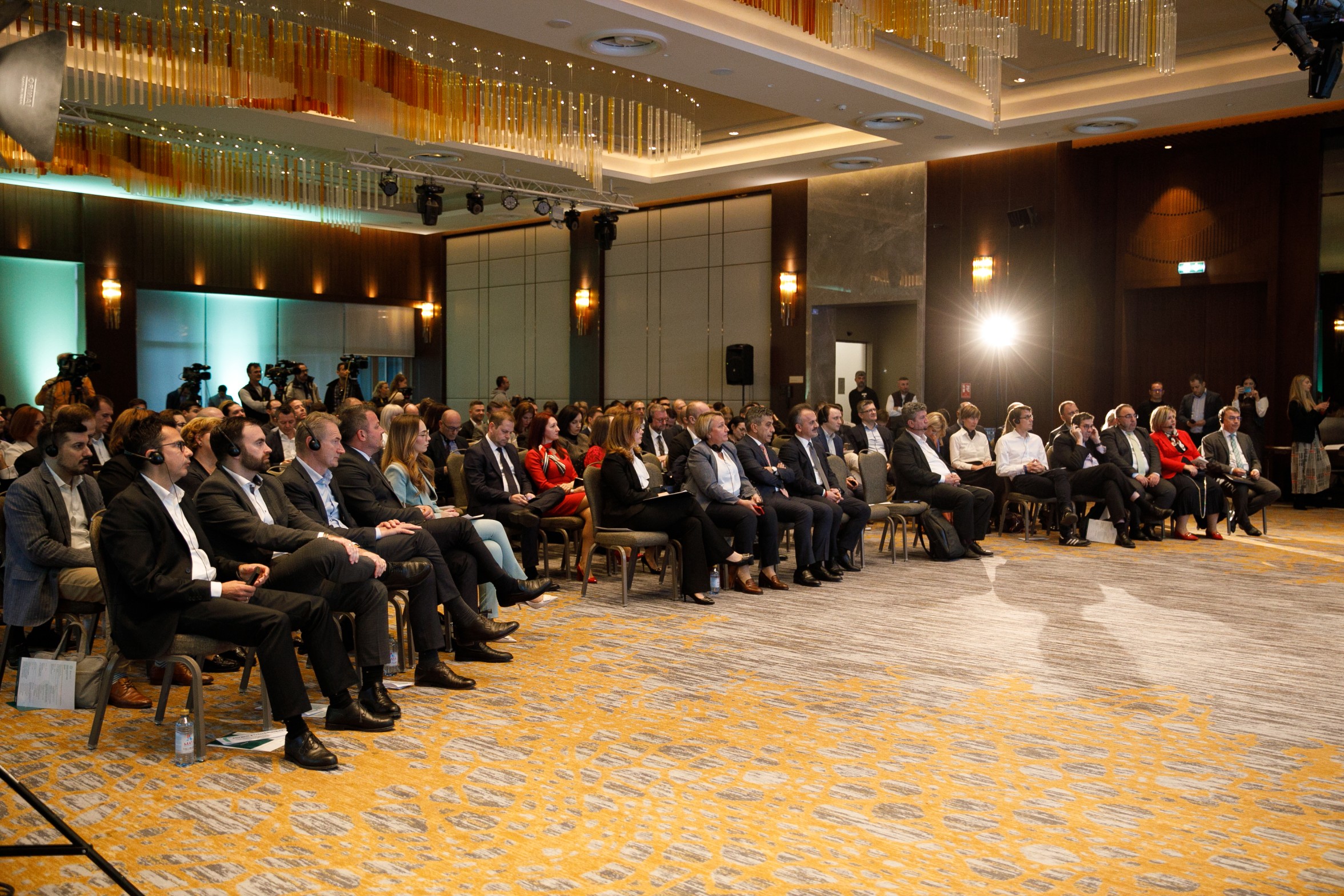
Key Takeaways from MARES Annual Conference 2024 (Panel 1)
The MARES Annual Conference 2024 kicked off with insightful opening speeches that set the stage for meaningful discussions. Slobodan Popovski, President of MARES, emphasized that renewable energy sources are not only essential to North Macedonia’s future but also critical for energy stability across the region. Popovski noted that MARES aims to act as a catalyst for change, highlighting the conference as a platform for sharing ideas and best practices. He recognized the support of key partners, including GIZ, EBRD, NLB Bank and Sparkasse Bank.
Izet Mexhiti, Deputy Prime Minister and Minister of Environment and Physical Planning, echoed the importance of the Green Agenda for the Western Balkans and underscored the opportunity for North Macedonia to transform its energy sector with the support of regional and international stakeholders.
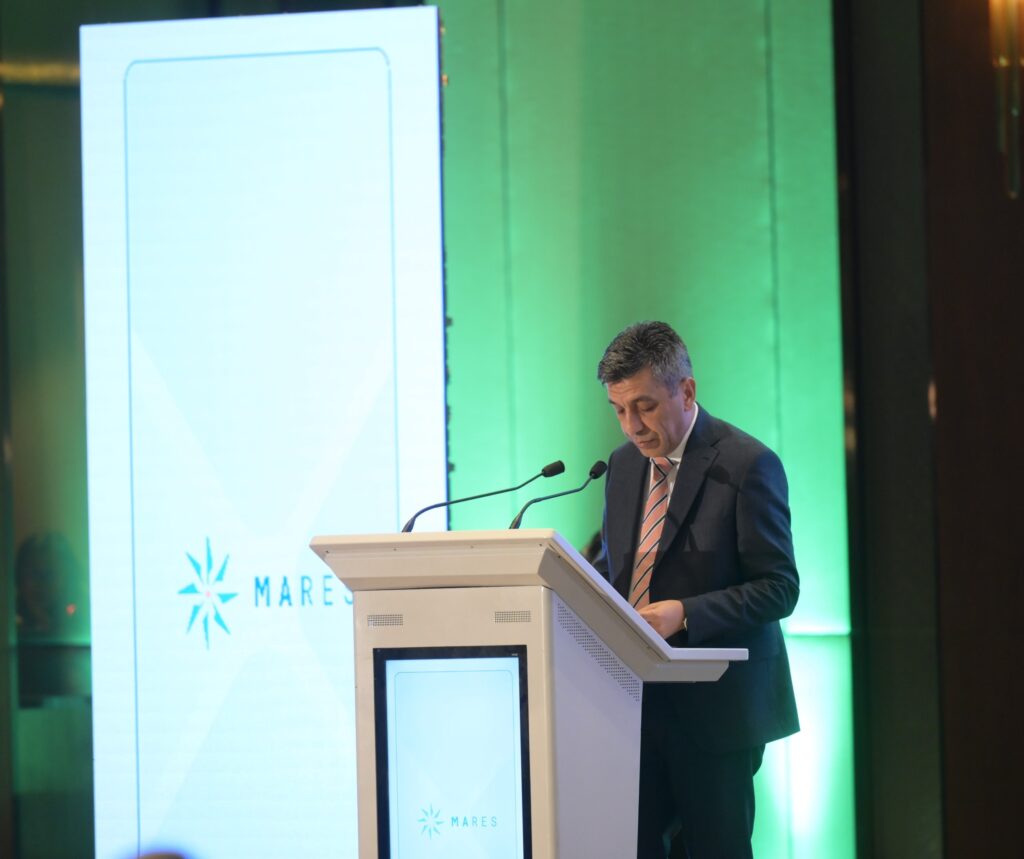
Summary Points from Panel 1 – “Strategic Overview of Renewable Energy Implementation“
The first panel, moderated by Dena Krsteska of MARES’s Legal Committee, centered around North Macedonia’s renewable energy strategy and the steps needed to implement it effectively.
Samoil Celeski, as the keynote speaker representing MARES, presented an analysis supported by GIZ on the current state of the energy sector, focusing on the Energy Strategy to 2040. He outlined three development scenarios—baseline, referent, and green—predicting that the green scenario could result in 90% of energy being sourced from renewables. Celeski stressed the urgency of moving away from fossil fuels and increasing solar and wind capacities to reach these targets.
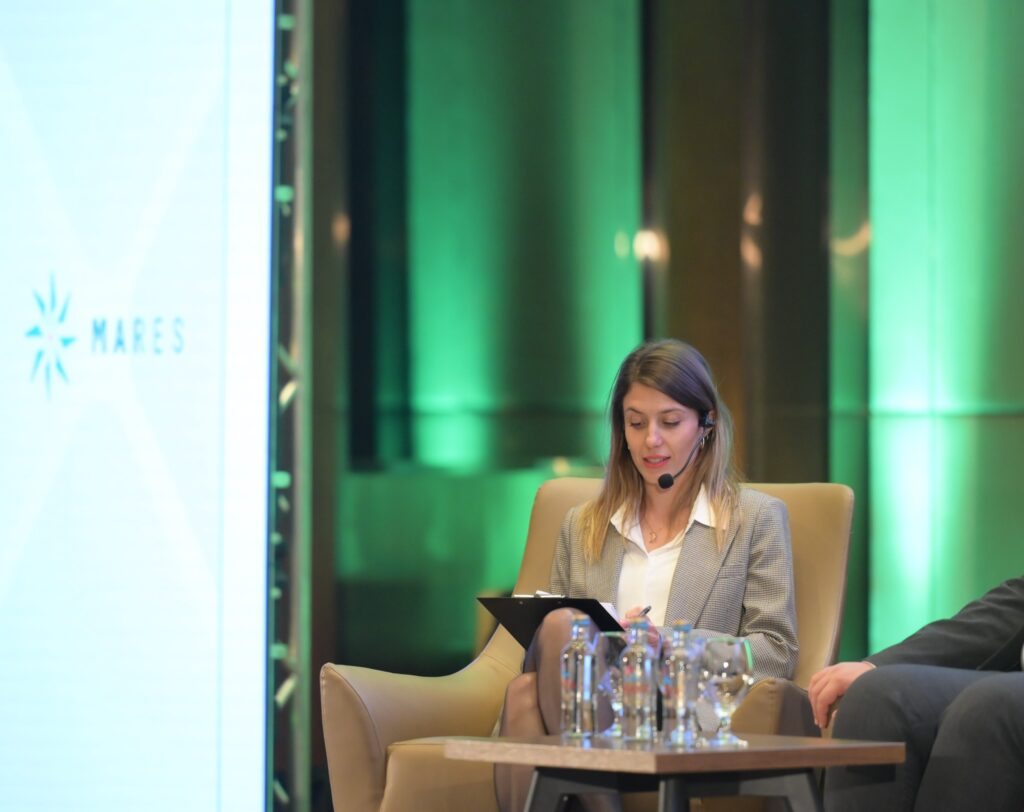
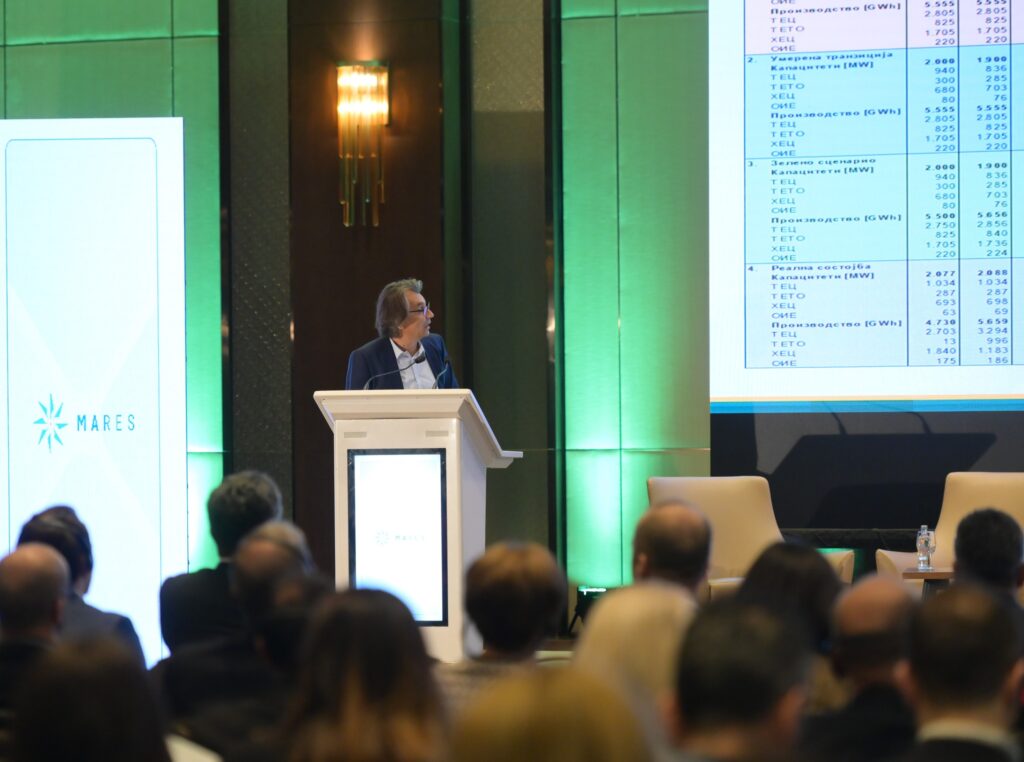
Elena Ivanovska from the Ministry of Energy, Mining and Mineral Resources, emphasized that the newly established ministry would bring significant benefits to North Macedonia at a time when energy issues are critical. One of the Ministry’s key priorities is the implementation of larger renewable energy capacities, alongside strengthening its internal capacities. In addition, the Ministry is focused on adopting new legal solutions to ease the integration of renewable energy and aligning its regulations with European directives and standards as part of the country’s EU integration process.
As part of this process, secondary legislation is expected to be adopted within 6 to 18 months. The Ministry will also play a central role in coordinating energy projects, enhancing collaboration among institutions, and reducing the country’s dependence on energy imports. Furthermore, the Ministry’s efforts extend to ensuring a just energy transition and representing North Macedonia at international forums such as UN conferences and U.S. State Department meetings. A key initiative in this regard is the development of green certificates for the purchase of renewable energy, which will further align the country’s energy policies with global sustainability goals.

Marko Bislimoski, President of the Energy and Water Services Regulatory Commission of the Republic of North Macedonia (ERC) highlighted the complexities of transitioning to green energy, emphasizing the importance of new market regulations and monitoring mechanisms for a just energy transition. The ERC’s evolving role in overseeing electricity and natural gas markets, as well as advancing market liberalization, will be crucial for North Macedonia’s integration into the pan-European energy market.
He also discussed the new responsibilities that ERC will gain under the new regulations, especially in the area of regulation of electricity and natural gas markets, as well as monitoring market coupling processes—aiming for North Macedonia to become part of the pan-European electricity and natural gas markets. He also spoke about the trend toward market liberalization in both electricity and gas markets, as well as the new method of setting prices for end consumers and reduced participation by the regulator.
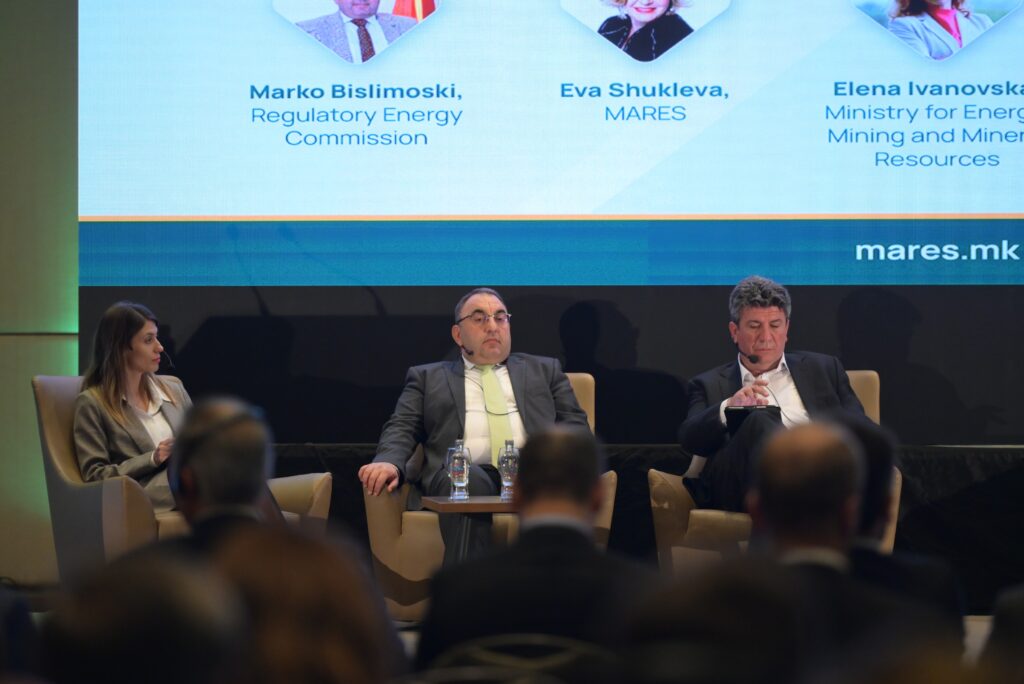
Aleksandar Paunoski, Deputy General Manager of MEPSO highlighted the importance of grid flexibility to enable a successful transition. He mentioned that MEPSO’s activities and government initiatives are closely coordinated as part of the green transition, with a primary focus on increasing grid flexibility. MEPSO is actively working on projects to rehabilitate existing and build new capacities, including battery systems to improve flexibility. He highlighted several key projects, such as the rehabilitation of transmission lines and the construction of new transformer stations, digitization of certain stations, as well as strengthening cybersecurity with the support of EBRD and USAID. Paunoski also emphasized the importance of collaboration with partner companies for grid upgrades.
Eva Shukleva, Board Member of MARES discussed initiatives to boost energy efficiency and integrate renewables. She emphasized that the administration of renewable energy projects requires significant support.
Shukleva spoke about the challenges investors face when developing projects, summarizing them as administrative barriers, legal ambiguities and inconsistencies, lack of transparency in institutions, and inaccessibility of institutions, all supported by concrete examples from everyday practice.
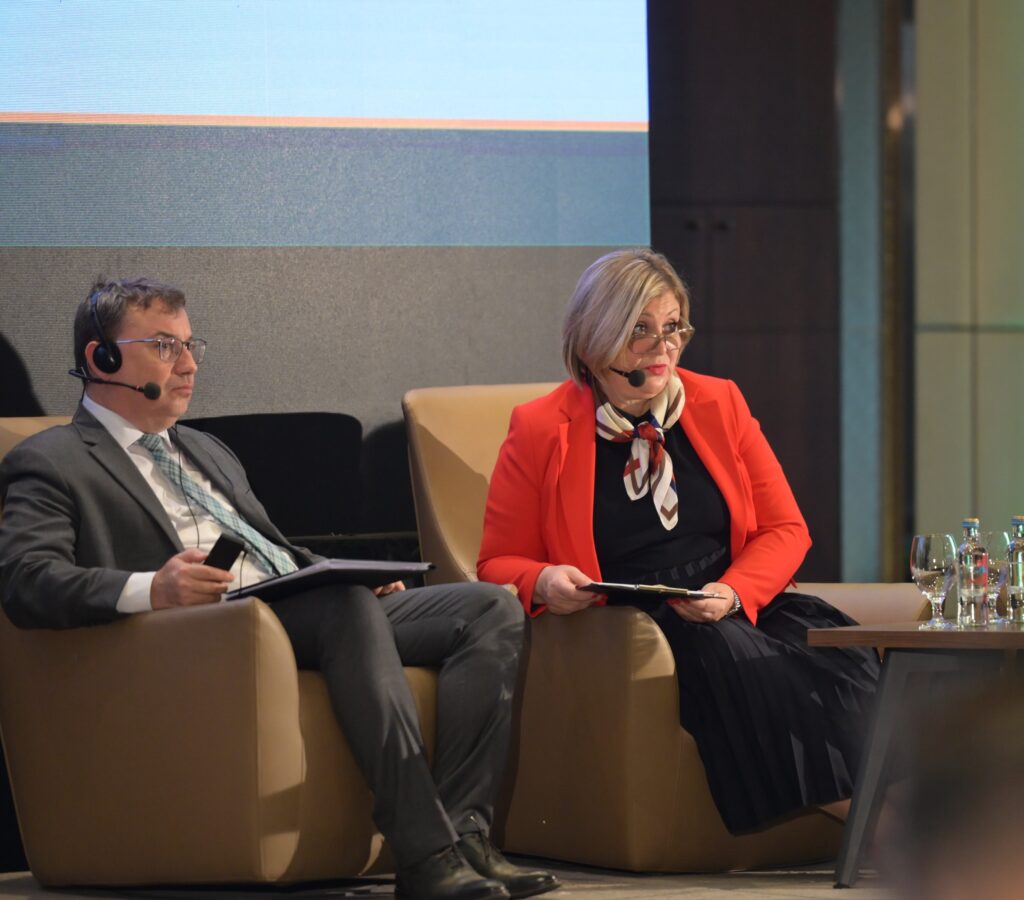
Alexandru Albu, Head of Section at the EU Delegation to North Macedonia, spoke about the challenges the country will face in implementing measures for the green transition, especially concerning its justness. Albu explained that the European Union is supporting North Macedonia’s carbon reduction efforts as part of a new development plan for the Western Balkans. This plan includes market integration and necessary reforms to be completed by 2027, alongside €750 million in financial assistance for North Macedonia. Albu noted the goal of achieving 0.7 gigawatts in new renewable capacity by 2027 and stressed that the green transition requires coordinated efforts from government and other institutions to meet long-term objectives. He emphasized that the transition away from coal needs to be addressed urgently, with support from the EU and EBRD.
Conclusions and Next Steps
The discussions in this first panel underscored the importance of a collaborative approach between government institutions, regulatory bodies, and private sector stakeholders to drive the green transition. Achieving North Macedonia’s renewable energy targets will require significant investment in infrastructure, the adoption of supportive legal frameworks, and a strong commitment to aligning with EU standards. The challenges are substantial, but the opportunities for transformation are equally significant, offering a clear way forward for a more resilient and sustainable energy system for the country and the region.
Stay tuned for the upcoming takeaways from the next three panels, where we will continue to highlight key insights and next steps in driving the green transition forward.
